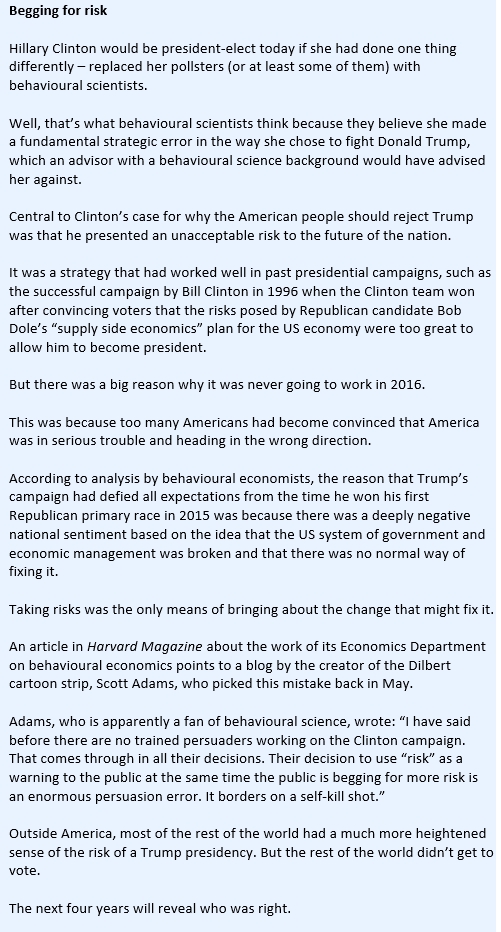As political parties around the world try to work out why opinion pollsters are struggling to get accurate readings of what is on voters’ minds, governments are beginning to tap into pioneering research that is finding new ways to influence the behaviour of citizens.
With Britain leading the way, policy makers are using new findings from the field of behavioural science to try to read the minds of the consumers of government programmes to both achieve more cost effective delivery of services and more effective compliance in revenue raising areas such as taxation.
The new approach, which links behavioural science and economics, fundamentally challenges the neo-liberal philosophy that has dominated economic policy for half a century since the Thatcher-Reagan revolution.
The standard model of human behaviour used in neo-classical or market economics assumes that Economic Man makes logical, rational, self-interested decisions that weigh the costs and benefits of a situation and maximizes the value and profit to themselves and therefore for the society as a whole.
But the new approach, which is based on pioneering research at the Harvard University Department of Economics, regards Economic Man as a mirage.
Its starting assumption is that people make decisions on all kinds of irrational, self-delusional and, often, altruistic behaviour which leads to much less optimal outcomes for the individual and for society.
After decades of study of how people actually make choices, the Harvard behavioural economists argue that the idea of the “Economic Man” who was capable of “perfect self-regulation in pursuit of his future goals and unswayed by bodily states and feelings” was simply “a marvelously convenient pawn for building academic theories”.
It says it has built a “critical mass” of empirical research on the way people make choices that “upends the neo-classical theories”.
In 2010 the British government decided to test the Harvard ideas by establishing what it called The Behavioural Insights Team (BIT), which began applying the behavioural science theory to the design and implementation of government policies.
Six years later, the BIT is playing a major part in British government policymaking, providing analysis and advice across the Civil Service.
The work has attracted international attention and the British government is now selling its services to a number of countries.
 The Australian Government has recently established a Behavioural Economic Team (BETA) in the Department of Prime Minister and Cabinet, headed by Professor Michael Hiscox, an Australian expatriate hired from the Harvard Department of Economics.
The Australian Government has recently established a Behavioural Economic Team (BETA) in the Department of Prime Minister and Cabinet, headed by Professor Michael Hiscox, an Australian expatriate hired from the Harvard Department of Economics.
In the latest annual report of the British BIT project, Cabinet Office Minister Ben Gummer explained that, in the past, government policy work was based on “an educated guess at how people will respond” to new government programmes and initiatives.
“Too often that guess is wrong: we have to return to problems we thought had been solved or to correct perverse outcomes that were not anticipated at the beginning. Perhaps, most importantly, opportunities were missed to achieve a policy end without the need for writing new law,” he said.
“By employing behavioural evidence and empirically-based research, BIT can help ensure that, where possible we deliver policy aims by working with the way that people live their lives, rather than interposing – often to little effect – with the crude armoury of the legislating state.
“BIT can help ensure that it is designed correctly so that is has the greatest chance of achieving its desired ends.
“BIT is now a central part of how government goes about its business.”
One of the most recent successes claimed by the UK’s BIT is the impact of the government’s soft drinks levy or sugar tax. The levy, to come into effect in 2018, will impose taxes on soft drinks, according to the amount of sugar in the drink.
The tax was based on BIT research which concluded that it would have an effect on sugar consumption well ahead of the date it was introduced because manufacturers were likely to cut sugar levels in their products as soon as possible to avoid having to pay the tax.
Already, several manufacturers have announced that they are significantly reducing the amounts of sugar in their products.
In health policy, BIT work on the over-prescribing of antibiotics in the NHS led to analysis of the number of prescriptions being written by every doctor and then comparing that with the rate of prescribing by 80 per cent of their peers.
When doctors were told that their rate was greater than the 80 per cent, there was an immediate 3.3 per cent reduction in total prescriptions written.
The Australian Government says it decided to establish BETA because it was convinced by Britain’s findings that subtle changes can be made to government policy to “gently guide or nudge voters into making decisions that are better for them and for everybody else while still giving them choices. “
A clear example was the success of programmes in which voters were offered the chance to opt out of a programme, rather than to opt in.
The Australian Government is looking to use the programme to try to find new ways of encouraging voters to regard the payment of income tax as being a social good and a community benefit. The Australian Tax Office has battled for years to close the so-called Tax Gap, between the amount of tax that should be paid and the amount that is actually paid, which has been steadily growing.
As Britain looks for post-Brexit, export-led growth opportunities, the work of the BIT might prove to be a valuable little earner.
By Geoff Kitney

Other articles associated with today’s editorial are:-
Editorial: The science of Brexit behaviour
Political regret you just have to live with by Geoff Kitney
All in it together – some of the time! by David Rawlings




